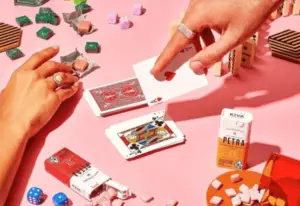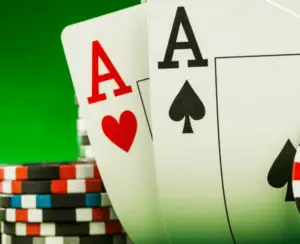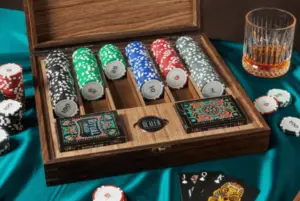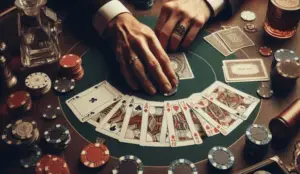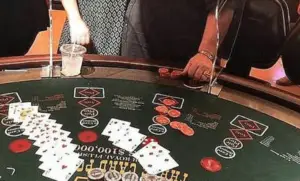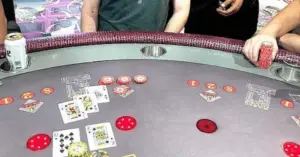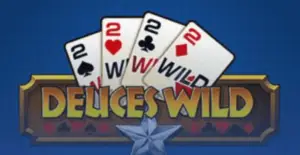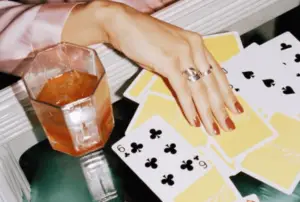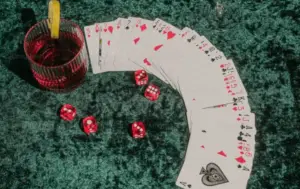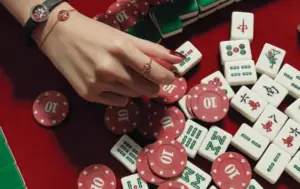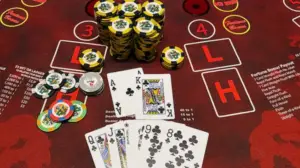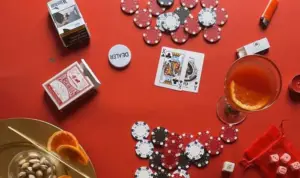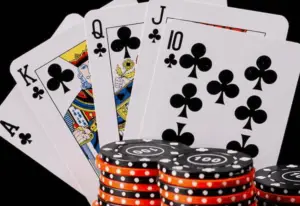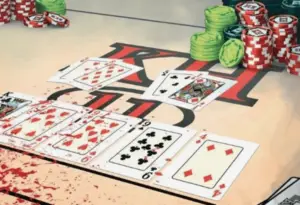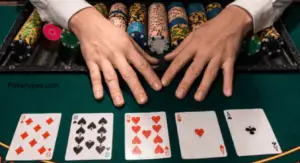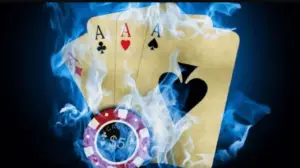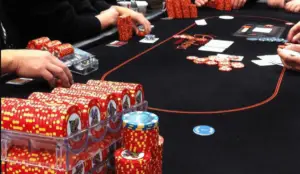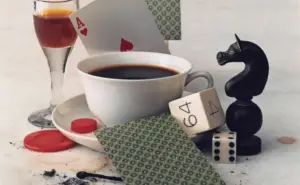7 Card Stud Poker is a classic card game that’s been dealing out excitement for decades. Unlike its flashy cousin Texas Hold’em, 7 Card Stud is all about skill, memory, and reading your opponents.
In this game, you’re not just playing the cards in your hand – you’re playing the person across the table.
Whether you’re a poker newbie or a seasoned pro, 7 Card Stud offers a thrilling challenge.
You’ll need to keep your wits about you as you track visible cards, calculate odds, and try to figure out what your opponents are holding.
Ready to dive into the world of 7 Card Stud? Buckle up, because we’re about to take you on a wild ride through the ins and outs of this exciting poker variant. Let’s get started!
History and Evolution of 7 Card Stud Poker
7 Card Stud has been around since the American Civil War. It started out as a simple game played by soldiers to pass the time. Over the years, it grew in popularity and became a staple in casinos and home games alike.
In the early days,7 Card Stud was the go-to game for poker players. It was the main event at the World Series of Poker until Texas Hold’em took over in the 1970s. Even though it’s not as popular now, many poker pros still love it for its skill and strategy.
| Era | Popular Poker Game |
| 1800s-1970s | 7 Card Stud |
| 1970s-Present | Texas Hold’em |
How to play 7 Card Stud Poker?
Playing 7 Card Stud is pretty straightforward. Here’s the gist:
Each player gets seven cards in total
Three cards face down (your hole cards)
Four cards face up (your street cards)
You make the best five-card hand you can
The game starts with everyone getting two cards face down and one face up. Then there’s a round of betting.
After that, players get one card face up at a time, with betting after each new card. The last card is dealt face down, followed by a final round of betting.
7 Card Stud Poker rules for beginners
If you’re new to 7 Card Stud, here are some key rules to remember:
The game is usually played with 2-8 players
There’s a small ante that everyone pays before the deal
The player with the lowest face-up card starts the betting
You can fold, call, or raise on your turn
The best five-card hand wins the pot
It might seem like a lot at first but don’t worry. You’ll get the hang of it in no time!
7 Card Stud Poker betting rounds explained
7 Card Stud has five betting rounds. Here’s how they work:
Third Street: After the first three cards are dealt
Fourth Street: After the fourth card is dealt
Fifth Street: After the fifth card is dealt
Sixth Street: After the sixth card is dealt
Seventh Street (or River): After the last card is dealt
In each round, players can check, bet, call, raise, or fold. The betting limits usually double on fifth street, so watch out for that!
7 Card Stud Poker hand rankings
Knowing your hand rankings is crucial in 7 Card Stud. Here they are from highest to lowest:
- Royal Flush
- Straight Flush
- Four of a Kind
- Full House
- Flush
- Straight
- Three of a Kind
- Two Pair
- One Pair
- High Card
Remember, you’re trying to make the best five-card handout of your seven cards.
7 Card Stud Poker terminology and lingo
Like any poker game,7 Card Stud has its own lingo. Here are some terms you’ll hear at the table:
- Bring-in: The forced bet made by the player with the lowest upcard
- Door Card: Your first face-up card
- Fourth Street: The second round of betting
- Rolled Up: Starting with three of a kind in your first three cards
- Trips: Three of a kind
Understanding the Game Dynamics
Now that we’ve covered the basics, let’s dig deeper into how 7 Card Stud works and what makes it unique.
7 Card Stud Poker etiquette and table rules
Good poker etiquette is important in any game, but especially in 7 Card Stud. Here are some key rules to follow:
- Don’t slow down the game
- Keep your cards visible
- Don’t discuss your hand while playing
- Be respectful to other players and the dealer
Remember,7 Card Stud is a game of memory and observation. Talking about your hand can give away important info to other players.
| Do | Don’t |
| Keep cards visible | Discuss your hand |
| Act in turn | Slow down the game |
| Be respectful | Give away information |
Differences between 7 Card Stud and Texas Hold’em
7 Card Stud and Texas Hold’emare both poker games, but they’re pretty different. Here’s how:
In 7 Card Stud, you get your own cards. No community cards like in Hold’em.
7 Card Stud has more betting rounds (5 vs. 4 in Hold’em)
Position changes in 7 Card Stud based on face-up cards
7 Card Stud is more about memory and reading opponents
If you’re used to Hold’em,7 Card Stud might feel a bit strange at first. But give it a chance – many players find it even more exciting!
7 Card Stud Poker vs. 5 Card Stud: Key differences
5 Card Stud is like the little brother of 7 Card Stud. Here’s how they differ:
- 7 Card Stud gives you 7 cards, 5 Card Stud only 5
- 7 Card Stud has more betting rounds (5 vs. 4)
- 7 Card Stud allows for more complex hands
- 5 Card Stud is simpler and faster
Both games are fun, but 7 Card Stud offers more strategy and excitement.
The basic strategy for 7 Card Stud Poker
When you’re starting out in 7 Card Stud, keep these tips in mind:
- Pay attention to what cards are out
- Start with strong hands (pairs or high cards)
- Watch your opponents’ up cards
- Be patient and wait for good spots
- Don’t be afraid to fold if your hand isn’t improving
Remember,7 Card Stud is a game of information. The more you notice, the better you’ll play.
Best starting hands in 7 Card Stud Poker
In 7 Card Stud, your first three cards are crucial. Here are some great starting hands:
Three of a kind (also called “rolled up”)
High pairs (Aces, Kings, Queens)
Three cards to a flush or straight
Big connectors (like KQJ)
These hands give you a strong start and a good chance of winning the pot.of skill That wraps up the first section of our 7 Card Stud Pokerguide.
Remember, this game is all about patience, observation, and smart betting. Keep practicing, and you’ll be a stud in no time!
Mastering 7 Card Stud Poker Techniques
7 Card Stud Poker isn’t just about the cards you’re dealt. It’s a game of skill, strategy, and sharp observation. Let’s dive into some advanced techniques that’ll help you up your game.
How to read opponents in 7 Card Stud Poker?
Reading your opponents in 7 Card Stud is like being a detective. You’ve got to pay attention to every little clue. Here’s what to watch for:
- Betting patterns: Does your opponent always bet big with strong hands?
- Facial expressions: Look for those tiny tells when they get their cards.
- Timing: A quick bet might mean strength, while hesitation could signal weakness.
Remember, in 7 Card Stud, you can see some of your opponents’ cards. This gives you a big advantage if you know how to use it.
| Observation Skill | What It Tells You |
| Betting Patterns | Strength of hand |
| Facial Expressions | Reaction to cards |
| Timing of Bets | Confidence level |
Reading board textures in 7 Card Stud Poker
Board texture in 7 Card Stud refers to the visible cards on the table. It’s like putting together a puzzle. Here’s how to read it:
Look for paired cards: If you see a lot of pairs, it might mean someone has trips.
Watch for suited cards: Three or more of the same suit could signal a flush draw.
Check for connected cards: These might indicate straight possibilities.
By reading the board, you can guess what hands your opponents might have. This helps you make better decisions about betting or folding.
7 Card Stud Poker odds and probabilities
Knowing theoddsin7 Card Stud is like having a secret weapon. It helps you make smart choices about when to bet and when to fold. Here are some key odds to remember:
- The odds of getting a pair on your first three cards is about 1 in 3.
- Your chances of improving a pair to three of a kind by the river is about 1 in 8.
- The probability of making a flush when you start with three suited cards is about 1 in 5.
| Starting Hand | Odds of Improving |
| Pair | 1 in 3 to three of a kind |
| Three Flush | 1 in 5 to a flush |
| Three Straight | 1 in 4 to a straight |
How to bluff effectively in 7 Card Stud Poker?
Bluffing in 7 Card Stud is an art. It’s not just about pretending you have a good hand. It’s about telling a believable story with your bets. Here’s how to bluff like a pro:
- Choose your spots: Bluff when the board looks like it could have helped your hand.
- Consider your image: If you’ve been playing tight, your bluffs are more likely to work.
- Watch your opponents: Bluff against players who are likely to fold under pressure.
Remember, a good bluff is all about making your opponent believe you have the best hand. But don’t overdo it. Too much bluffing can make you predictable.
Common mistakes to avoid in 7 Card Stud Poker
Even good players make mistakes in 7 Card Stud. But if you know what to watch out for, you can avoid these common pitfalls:
Playing too many hands: Be picky about your starting hands.
Ignoring opponents’ up cards: These give you valuable information. Use it!
Chasing draws: Don’t waste money on unlikely draws.
Forgetting about dead cards: Keep track of folded cards. They affect your odds.
Tilting: Don’t let emotions control your play. Stay cool, even when you’re losing.
By avoiding these mistakes, you’ll save money and improve your game in the long run.
Advanced Strategies and Game Formats
Now that we’ve covered the basics, let’s dive into some advanced strategies and different game formats in 7 Card Stud Poker.
Tips for winning at 7 Card Stud Poker
Winning at 7 Card Stud takes more than just luck. Here are some pro tips to help you come out on top:
- Play tight early: Be selective with your starting hands.
- Pay attention to live cards: These are cards that can improve your hand.
- Use position to your advantage: Late position gives you more information.
- Adjust to your opponents: Change your strategy based on how others are playing.
- Manage your bankroll: Don’t risk more than you can afford to lose.
Remember, consistency is key in 7 Card Stud. Stick to your strategy, but be ready to adapt when needed.
| Strategy | Benefit |
| Tight Early Play | Saves money, improves hand selection |
| Position Awareness | Provides more information for decision-making |
| Bankroll Management | Ensures long-term sustainability |
Advanced Techniques for 7 Card Stud Poker
Once you’ve got the basics down, try these advanced techniques to take your game to the next level:
- Semi-bluffing: Bet with drawing hands that have the potential to improve.
- Slow-playing: Underplay a strong hand to trap opponents.
- Check-raising: Check with a strong hand, then raise when an opponent bets.
- Stealing antes: Raise with marginal hands when you’re in a late position.
These techniques can be powerful, but use them wisely. They work best when your opponents don’t expect them.
7 Card Stud Poker Tournament Strategies
Tournament play in 7 Card Stud is a whole different ball game. Here’s how to adjust your strategy:
Preserve chips early: Play conservatively in the beginning stages.
Increase aggression as blinds rise: You’ll need to take more risks as the tournament progresses.
Pay attention to stack sizes: Adjust your play based on your chip stack and your opponents’.
Look for spots to accumulate chips: Take advantage of weaker players and good situations.
Remember, in tournaments, survival is key. Sometimes, folding a decent hand is the right move if it keeps you in the game.
7 Card Stud Poker: Cash game vs. tournament strategies
Cash games and tournaments in7 Card Stud require different approaches. Here’s a quick comparison:
- Cash games: You can rebuy if you lose your stack. This allows for more aggressive play.
- Tournaments: You’re out if you lose all your chips. This calls for more conservative play, especially early on.
In cash games, focus on maximizing value from each hand. In tournaments, focus on survival and chip accumulation.
| Aspect | Cash Game | Tournament |
| Risk Tolerance | Higher | Lower |
| Playing Style | More aggressive | More conservative early |
| Focus | Maximizing each hand | Survival and chip accumulation |
Bankroll management for 7 Card Stud Poker
Good bankroll management is crucial in 7 Card Stud. It’s what keeps you in the game long-term. Here are some tips:
- Never play with money you can’t afford to lose.
- Have at least 300 big bets for your usual stake.
- Move down in stakes if your bankroll drops below this level.
- Keep track of your wins and losses.
- Don’t chase losses by playing higher stakes.
Remember, even the best players have losing streaks. Good bankroll management helps you weather these storms.
Mental game tips for 7 Card Stud Poker players
The mental game is just as important as the technical aspects in 7 Card Stud. Here’s how to stay sharp:
Stay focused: Pay attention to every hand, even when you’re not in it.
Control your emotions: Don’t let bad beats tilt you.
Take breaks: Step away from the table if you feel yourself losing focus.
Stay positive: A good attitude can help you make better decisions.
Learn from your mistakes: Review your play after each session.
Variations and Professional Play
7 Card Stud isn’t just one game – it’s a whole family of exciting poker variants. Let’s explore some popular variations and how the pros play them.
7 Card Stud Poker variations and side games
7 Card Stud comes in many flavors. Here are some popular variations:
- Razz: The goal is to make the lowest hand possible.
- Hi-Lo: The pot is split between the highest and lowest hands.
- Baseball: Threes and nines are wild, and a four gets you an extra card.
These games add spice to your poker night and challenge you in new ways.
| Variation | Key Difference |
| Razz | Lowest hand wins |
| Hi-Lo | Pot split between high and low |
| Baseball | Wild cards and extra draws |
7 Card Stud Poker: High-only vs. High-Low variations
In High-only 7 Card Stud, the best hand wins the whole pot. But in High-Low (or Hi-Lo) games, things get interesting:
- The pot is split between the best high hand and the best low hand.
- To qualify for low, a hand must have five cards 8 or below (called “8 or better”).
- If there’s no qualifying low hand, the high hand takes the whole pot.
This variation adds a whole new layer of strategy. You might be going for the best hand, or you could be trying to “scoop” the whole pot by winning both high and low!
7 Card Stud Poker in mixed game formats (e.g., HORSE)
HORSE is a popular mixed game format that includes 7 Card Stud. Here’s the breakdown:
H: Hold’em
O: Omaha Hi-Lo
R: Razz
S: Seven Card Stud
E: Seven Card Stud Eight or Better (Hi-Lo)
Pro players love mixed games because they test all-around poker skills. If you want to be a true poker champion, you’ll need to master 7 Card Stud along with other variants.
Famous 7 Card Stud Poker players and their strategies
Some of the greatest poker legends made their names by playing 7 Card Stud. Let’s look at a few:
- Chip Reese: Known for his aggressive play and great hand reading.
- Doyle Brunson: A master of bluffing and playing position.
- Daniel Negreanu: Famous for his ability to read opponents and adjust his strategy.
These pros all have different styles, but they share one thing: they’re always paying attention to what’s happening at the table.
| Player | Key Strategy |
| Chip Reese | Aggression and hand-reading |
| Doyle Brunson | Bluffing and position play |
| Daniel Negreanu | Reading opponents and adaptability |
Improving Your Game
Want to get better at 7 Card Stud? Here are some ways to level up your game.
How to practice 7 Card Stud Poker online
You don’t need a casino to practice 7 Card Stud. Here are some ways to play online:
- Online poker rooms: Many sites offer 7 Card Stud games.
- Play money games: Practice without risking real cash.
- Training sites: Some poker training platforms have 7 Card Stud modules.
Remember, practice makes perfect. The more hands you play, the better you’ll get!
7 Card Stud Poker software and tools for analysis
Poker pros use all kinds of tools to improve their game. Here are some you might find helpful:
- Hand analyzers: Input your hands and get feedback on your play.
- Odds calculators: Figure out your chances of winning in different situations.
- Tracking software: Keep records of your play to spot trends and leaks.
These tools can give you a big edge, especially when you’re learning the game.
7 Card Stud Poker in Home Games: Tips and House Rules
Home games are a great way to enjoy 7 Card Stud with friends. Here are some tips:
Set clear rules before you start playing.
Decide on stakes that everyone is comfortable with.
Consider using a dealer button to keep track of who deals with each hand.
Have fun! Home games are about enjoying poker with friends.
Remember, the best house rule is the one that makes the game fun for everyone.
| Home Game Tip | Benefit |
| Clear rules | Avoids arguments |
| Comfortable stakes | Keeps the game friendly |
| Dealer button | Keeps the game organized |
Transitioning from Hold’em to 7 Card Stud Poker
If you’re coming to 7 Card Stud from Texas Hold’em, here are some key differences to keep in mind:
No community cards – each player gets their own cards.
More betting rounds – five instead of four.
Starting hand selection is crucial – you can’t wait for the flop.
Pay attention to what cards are out – this affects your odds.
Don’t worry if it feels weird at first. With practice, you’ll get the hang of it!
Conclusion
7 Card Stud is a classic poker game that offers a ton of excitement and strategy. Whether you’re playing in a casino, online, or in a home game, there’s always something new to learn.
Remember, the key to success in 7 Card Stud is paying attention. Watch the cards, read your opponents, and always be thinking about what hand you’re trying to make.
So why not give 7 Card Stud a try? You might just find your new favorite poker game. Good luck at the tables!

